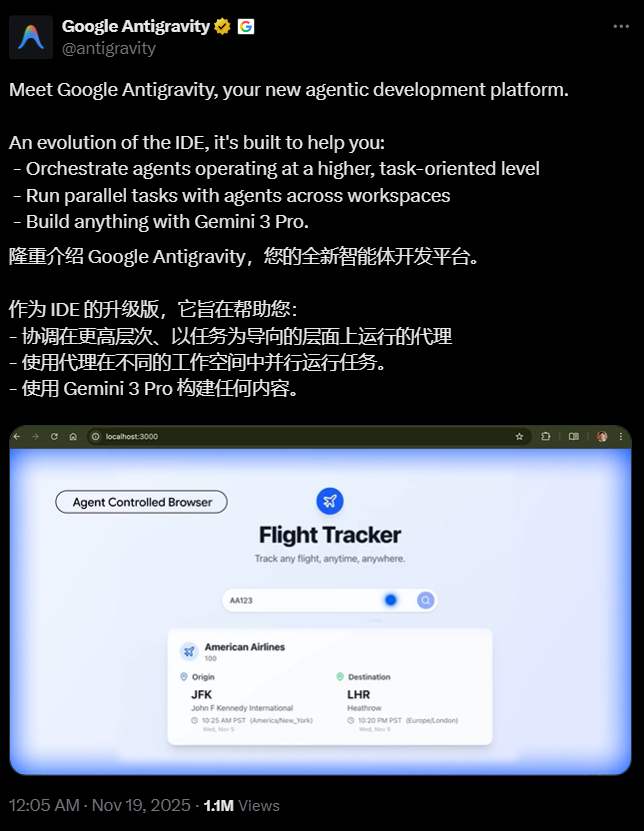Google officially launched its new generation of flagship large model Gemini3, and also introduced a brand-new AI-native integrated development environment (IDE) - Google Antigravity. This "anti-gravity" level proxy development platform upgrades AI from a simple code assistant to an "active partner", freeing developers from tedious low-level coding and addressing pain points of competitors such as Cursor and Claude. Currently, Antigravity is open for public preview, supporting Windows, macOS, and Linux systems, and it is completely free to use (with generous Gemini3Pro quotas).

AIbase Editorial View: This is not just a simple tool iteration, but a reshaping of the entire developer ecosystem by Google. Antigravity marks a comprehensive transformation of the AI coding era from "assistant type" to "agent-driven". In the future, whoever masters multi-agent parallelism + verifiable execution will dominate the AI development toolchain. Autonomous and parallel development: multiple agents "chaotically" run in the background. The core of Antigravity lies in the "Agent-First" design philosophy. Developers only need to provide high-level task descriptions (such as "build a flight query Web App"), and the agent driven by Gemini3 will:
Automatically develop implementation plans, list prerequisites, and suggest architectural designs;
Support multiple agents running asynchronously in the background, like a "task control center" that schedules resources;
Agents can directly operate code editors, terminal command lines, and browsers, achieving end-to-end autonomous development.
Compared with traditional IDEs' single-threaded AI assistants, Antigravity truly realizes the "human command, AI warfare" model, allowing developers to focus on creativity rather than typing code. Verifiable code quality: no longer believe "AI says it's correct." Trust issues are the biggest pain point of current AI coding tools. Antigravity solves this through its original "Artifacts" (verifiable products) mechanism:
After completing each step, the agent generates a task list and implementation plan;
Automatically provides screenshots before and after bug fixes, complete functional demonstration screen recordings, and even walkthroughs;
All products are presented in an intuitive way, allowing users to instantly verify whether the AI has truly completed the task, rather than relying solely on logs or tool call records.
AIbase Comment: This is equivalent to equipping AI with a "dash cam + third-party notary," greatly enhancing the credibility of production-grade code, especially suitable for enterprise-level development scenarios. Revolutionary collaborative feedback: edit code and pages like designers modify images. Antigravity elevates the feedback experience to a new level, completely overturning the inefficient "text description to change code" mode:
Developers can directly click, annotate, and leave comments on AI-generated web screenshots (e.g., "make this pop-up more prominent," "adjust this button color");
Support precise comments on code diffs and browser operation recordings;
All feedback does not require interrupting the agent process, and is directly asynchronously integrated into subsequent execution, even supporting Google Docs-style collaborative comments.
This feature makes "human-machine collaboration" as smooth and fluid as Figma modifying design drafts, completely bidding farewell to the embarrassment of "AI changes ten times but still doesn't get it right." Usability and ecosystem: free open-source models support, extremely low threshold. Antigravity not only deeply integrates Gemini3Pro, but also supports Claude Sonnet4.5 and OpenAI open-source models, with strong future ecosystem compatibility. It is already available on the official website (antigravity.google), and can be downloaded and experienced without payment, with a friendly quota refresh cycle, so ordinary developers almost never reach the limit.
AIbase Conclusion: The emergence of Google Antigravity signals that AI IDEs have officially entered the "multi-agent, verifiable, visual feedback" era. Players like Cursor, Claude Dev, and Windsurf face immense pressure - when Google combines the top-level reasoning capabilities of Gemini3 with browser-level execution power, the competitive landscape of developer tools has been completely rewritten. It is strongly recommended that all front-end, full-stack, and AI engineers immediately try it out; this may be the most valuable development tool of 2025!










